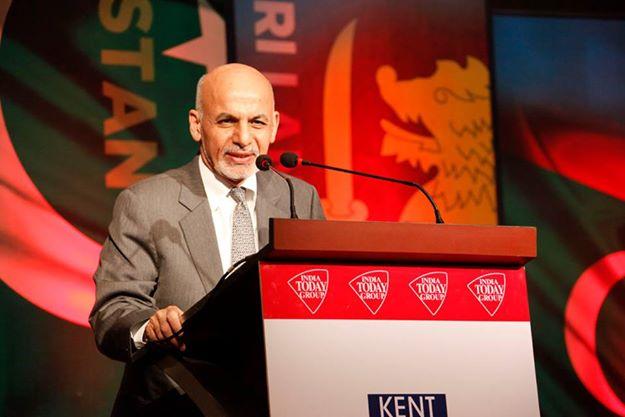KABUL (Pajhwok): President Ashraf Ghani on Wednesday said he would not allow anyone to conduct a proxy war in his country or Afghan territory to be used against its neighbours.
“We will not allow our territory to be used against any of our neighbours. But we will not permit anybody to conduct proxy wars on our soil either,” Ghani said at a meeting of South Asian leaders in Nepal that included India Prime Minister Narendra Modi and Pakistan‘s Nawaz Sharif.
His speech cones after warnings that the rivalry between India and Pakistan could spill across Afghan border. The nuclear-armed India and Pakistan have long accused each other of using proxy forces to try to gain influence in Afghanistan.
But the departure of NATO combat forces from Afghanistan has raised fears that their rivalry could escalate, further destabilising their troubled neighbour.
Former president Hamid Karzai frequently accused Islamabad of trying to destabilise the Kabul government by giving sanctuary to Taliban fighters.
Without mentioning Pakistan by name, Ghani said that state sponsorship of non-state actors could have damaging effects. “It should be clear that such measures have blowback effects, destabilising the state system,” he said.
Addressing the opening of the 18th Summit of the South Asian Association for Regional Cooperation (SAARC), Ghani dwelt extensively on the challenges Afghanistan faces and called for greater integration with his more affluent partners to spur economic growth.
Counterterrorism and security are also high on the agenda of the regional leaders’ meeting under the theme “Deeper Regional Integration for Peace and Prosperity.”
“Deeper integration within SAARC requires greater trust in making genuine solutions to understand the root causes of terrorism. Every problem must not be seen as a nail to be hit with the hammer of force,” Ghani said.
Asia’s economic boom needs to be tapped into by the rest of the SAARC countries, Ghani noted, especially in the field of energy where significant gas and oil resources could be used regionally to push up growth.
“Seeing Asia as a single region opens up new space for regional cooperation. It is not just integration but innovation that will promote cooperation,” he said.
Ghani also talked extensively about the need to promote accountability within Afghanistan to build a peaceful future and expressed appreciation for support from the SAARC members.
He urged the summit participants to implement agreements signed at this summit. Foreign ministers from the member states are expected to sign the SAARC Railway Agreement, Motor Vehicle Agreement and Framework Agreement on Energy Cooperation.
A 31-point draft declaration that touches on a wide range of issues including counterterrorism, trade and investment promotion, infrastructure development, youth employment, telecommunication tariff cuts, regional connectivity, social security for elderly people, literacy, and SAARC’s transformation into the South Asian Economic Union by 2030 is to be released at the end of the summit.
Born in 1985 in Bangladesh, SAARC groups eight South Asian countries – Afghanistan, Bangladesh, Bhutan, India, Maldives, Nepal, Pakistan and Sri Lanka. Afghanistan joined SAARC as its eighth member state in 2007.
On Tuesday, speaking at the India Today Global Roundtable in Kathmandu, President Ghani underlined the importance of regional economic integration.
He said the TAPI gas project was one such example that can bring far-reaching impact on the region’s economy.
“Imagine when the gas from Turkmenistan reaches Afghanistan, Pakistan and India. It will set in motion a series of developments which will immensely benefit all the nations. There are rare moments in history and this will be one of them,” Ghani said on the eve of the SAARC Summit.
“South Asia is on hand blessed with many things while on the other it is burdened with many issues. We have to overcome our problems soon to realise our common goals,” he said in his keynote address.
“Afghanistan is a backward country in many ways but there are changes that are taking place in the society. This is extraordinary for a country like ours,” he said.
He also said that South Asia is caught up with “numerous problems”. “Every day we deal with some form of violence in South Asia. It is also the least integrated region of the world,” he said.
“But there is hope. One day you may be able to have breakfast in Afghanistan, lunch in Pakistan and dinner in India. Hence, connectivity and regional economic integration is of utmost important for the common good,” Ghani said.
He said globalization has produced a huge middle class in China and India. “But it also has drawbacks and Afghanistan is suffering from that. The drug trade is rampant in some parts of the world which is in some ways aided by globalisation. There is this sense of abnormality that we have to deal with,” he said.
“Security issues are paramount and we have to address them through different fronts, including economy,” he added.
He said there were many obstacles in the way of regional integration. “Movement of goods and people through our borders should be free. Therefore, the first step is market integration; there is immense scope for enhancing this; presently, our markets are underdeveloped. The market is not just national but regional,” he said.
ma/mds/rm








GET IN TOUCH
NEWSLETTER
SUGGEST A STORY
PAJHWOK MOBILE APP